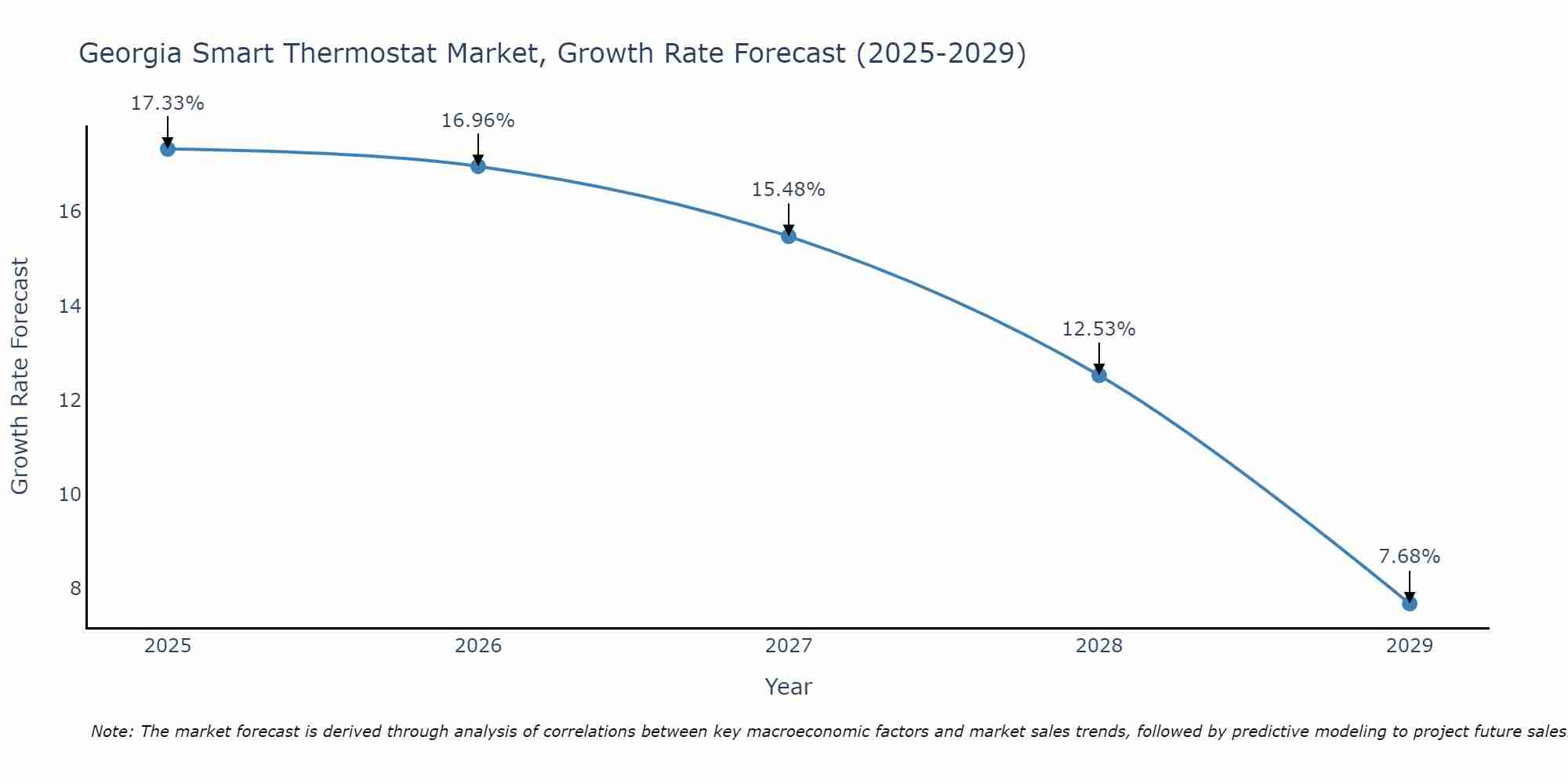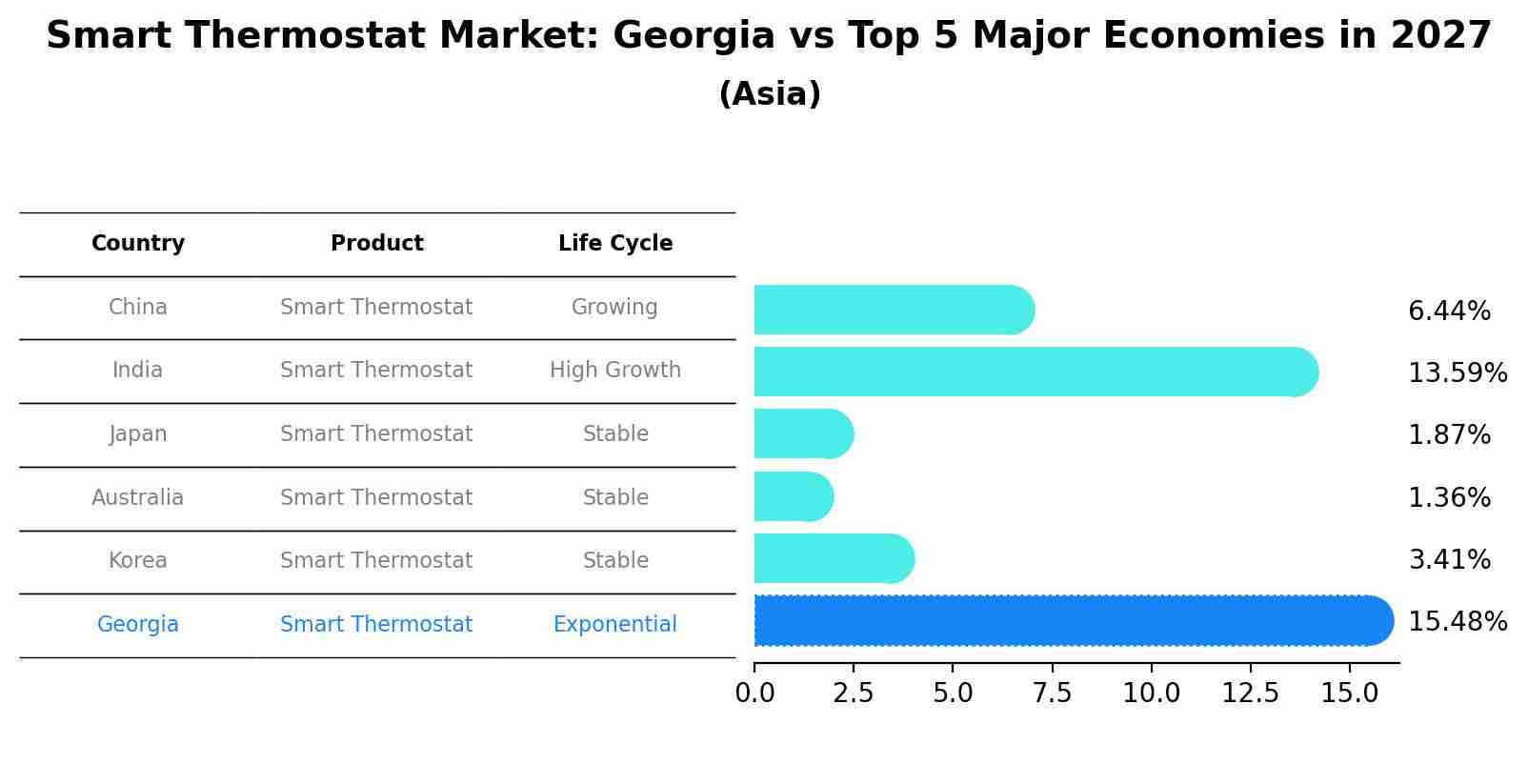Georgia Smart Thermostat Market Outlook | Share, Industry, Size, Trends, COVID-19 IMPACT, Forecast, Analysis, Value, Revenue, Companies & Growth
| Product Code: ETC369540 | Publication Date: Aug 2022 | Updated Date: Jul 2025 | Product Type: Market Research Report | |
| Publisher: 6Wresearch | Author: Sumit Sagar | No. of Pages: 75 | No. of Figures: 35 | No. of Tables: 20 |
Georgia Smart Thermostat Market Size Growth Rate
The Georgia Smart Thermostat Market may undergo a gradual slowdown in growth rates between 2025 and 2029. Beginning strongly at 17.33% in 2025, growth softens to 7.68% in 2029.

Smart Thermostat Market: Georgia vs Top 5 Major Economies in 2027 (Asia)
By 2027, the Smart Thermostat market in Georgia is anticipated to reach a growth rate of 15.48%, as part of an increasingly competitive Asia region, where China remains at the forefront, supported by India, Japan, Australia and South Korea, driving innovations and market adoption across sectors.

Georgia Smart Thermostat Market Synopsis
The Georgia smart thermostat market is experiencing significant growth driven by increasing adoption of smart home technologies, energy efficiency initiatives, and the desire for greater control over heating and cooling systems. Consumers in Georgia are increasingly recognizing the benefits of smart thermostats, such as energy savings, convenience, and improved comfort. The market is highly competitive with key players like Nest, Ecobee, and Honeywell offering a wide range of smart thermostat options. Factors such as the state`s climate variations, energy consumption patterns, and government incentives for energy-efficient upgrades are contributing to the growth of the smart thermostat market in Georgia. With a focus on sustainability and cost savings, consumers in Georgia are likely to continue embracing smart thermostat technology in the coming years.
Georgia Smart Thermostat Market Trends
The Georgia Smart Thermostat Market is experiencing a growing trend towards energy efficiency and smart home technology integration. Consumers are increasingly seeking ways to reduce energy consumption and lower utility bills, leading to a rising demand for smart thermostats that offer advanced features such as remote access, learning capabilities, and integration with other smart devices. Additionally, government incentives and rebate programs promoting energy-efficient products are driving further adoption of smart thermostats in Georgia. Manufacturers are responding to these trends by introducing new models with advanced functionality and improved compatibility with various heating and cooling systems. Overall, the Georgia Smart Thermostat Market is expected to continue its growth trajectory as consumers prioritize energy savings and convenience in their homes.
Georgia Smart Thermostat Market Challenges
In the Georgia Smart Thermostat Market, some key challenges are consumer awareness and adoption rates. Many consumers may not be fully aware of the benefits of smart thermostats, leading to a lack of interest in purchasing and installing these devices. Additionally, the initial cost of smart thermostats can be a barrier for some potential customers, as they are typically more expensive than traditional thermostats. Furthermore, there may be concerns about compatibility with existing HVAC systems and the perceived complexity of installation and operation. Addressing these challenges would require educating consumers about the energy-saving and convenience benefits of smart thermostats, offering incentives or rebates to make them more affordable, and providing clear guidance on compatibility and installation processes.
Georgia Smart Thermostat Market Investment Opportunities
The Georgia Smart Thermostat Market presents promising investment opportunities due to the increasing adoption of smart home technologies and the growing emphasis on energy efficiency. Smart thermostats offer benefits such as energy savings, convenience, and environmental sustainability, making them attractive to consumers. Investing in smart thermostat manufacturers, retailers, or service providers in Georgia could be profitable as the market is expected to expand with the rising demand for connected home devices. Additionally, partnerships with utility companies for incentive programs or government initiatives promoting energy-efficient products could further drive growth in the smart thermostat market in Georgia. Monitoring consumer preferences, technological advancements, and regulatory developments will be crucial for identifying and capitalizing on investment opportunities in this rapidly evolving market.
Jordan Agar Market Government Policies
The Georgia Smart Thermostat Market is influenced by several government policies aimed at promoting energy efficiency and sustainability. The Georgia Public Service Commission has approved various energy efficiency programs that incentivize the adoption of smart thermostats by providing rebates and other financial incentives to customers who install these devices. Additionally, the state of Georgia has implemented building codes and standards that require new construction and renovations to incorporate energy-efficient technologies, including smart thermostats. The Georgia Environmental Finance Authority also offers financing options for energy efficiency projects, which can help households and businesses afford the upfront costs of purchasing and installing smart thermostats. Overall, these government policies are driving the growth of the smart thermostat market in Georgia by encouraging consumers to adopt these energy-saving technologies.
Georgia Smart Thermostat Market Future Outlook
The future outlook for the Georgia Smart Thermostat Market appears promising as the adoption of smart home technologies continues to rise. Factors such as increasing awareness of energy efficiency, government initiatives promoting smart home solutions, and the growing trend of connected homes are driving the demand for smart thermostats in Georgia. Additionally, advancements in technology, such as the integration of artificial intelligence and machine learning capabilities, are enhancing the functionality and convenience of smart thermostats, further fueling market growth. With consumers increasingly seeking ways to reduce energy consumption and lower utility bills, the Georgia Smart Thermostat Market is expected to experience steady growth in the coming years, presenting opportunities for manufacturers and retailers in the region.
Key Highlights of the Report:
- Georgia Smart Thermostat Market Outlook
- Market Size of Georgia Smart Thermostat Market, 2021
- Forecast of Georgia Smart Thermostat Market, 2031
- Historical Data and Forecast of Georgia Smart Thermostat Revenues & Volume for the Period 2018 - 2031
- Georgia Smart Thermostat Market Trend Evolution
- Georgia Smart Thermostat Market Drivers and Challenges
- Georgia Smart Thermostat Price Trends
- Georgia Smart Thermostat Porter's Five Forces
- Georgia Smart Thermostat Industry Life Cycle
- Historical Data and Forecast of Georgia Smart Thermostat Market Revenues & Volume By Type for the Period 2018 - 2031
- Historical Data and Forecast of Georgia Smart Thermostat Market Revenues & Volume By Wireless for the Period 2018 - 2031
- Historical Data and Forecast of Georgia Smart Thermostat Market Revenues & Volume By Wireless for the Period 2018 - 2031
- Historical Data and Forecast of Georgia Smart Thermostat Market Revenues & Volume By End-User Vertical for the Period 2018 - 2031
- Historical Data and Forecast of Georgia Smart Thermostat Market Revenues & Volume By Residential for the Period 2018 - 2031
- Historical Data and Forecast of Georgia Smart Thermostat Market Revenues & Volume By Commercial for the Period 2018 - 2031
- Georgia Smart Thermostat Import Export Trade Statistics
- Market Opportunity Assessment By Type
- Market Opportunity Assessment By End-User Vertical
- Georgia Smart Thermostat Top Companies Market Share
- Georgia Smart Thermostat Competitive Benchmarking By Technical and Operational Parameters
- Georgia Smart Thermostat Company Profiles
- Georgia Smart Thermostat Key Strategic Recommendations
Frequently Asked Questions About the Market Study (FAQs):
- Single User License$ 1,995
- Department License$ 2,400
- Site License$ 3,120
- Global License$ 3,795
Search
Thought Leadership and Analyst Meet
Our Clients
Related Reports
- Canada Oil and Gas Market (2026-2032) | Share, Segmentation, Value, Industry, Trends, Forecast, Analysis, Size & Revenue, Growth, Competitive Landscape, Outlook, Companies
- Germany Breakfast Food Market (2026-2032) | Industry, Share, Growth, Size, Companies, Value, Analysis, Revenue, Trends, Forecast & Outlook
- Australia Briquette Market (2025-2031) | Growth, Size, Revenue, Forecast, Analysis, Trends, Value, Share, Industry & Companies
- Vietnam System Integrator Market (2025-2031) | Size, Companies, Analysis, Industry, Value, Forecast, Growth, Trends, Revenue & Share
- ASEAN and Thailand Brain Health Supplements Market (2025-2031) | Strategy, Consumer Insights, Analysis, Investment Trends, Opportunities, Growth, Size, Share, Industry, Revenue, Segments, Value, Segmentation, Supply, Forecast, Restraints, Outlook, Competition, Drivers, Trends, Demand, Pricing Analysis, Competitive, Strategic Insights, Companies, Challenges
- ASEAN Bearings Market (2025-2031) | Strategy, Consumer Insights, Analysis, Investment Trends, Opportunities, Growth, Size, Share, Industry, Revenue, Segments, Value, Segmentation, Supply, Forecast, Restraints, Outlook, Competition, Drivers, Trends, Demand, Pricing Analysis, Competitive, Strategic Insights, Companies, Challenges
- Europe Flooring Market (2025-2031) | Outlook, Share, Industry, Trends, Forecast, Companies, Revenue, Size, Analysis, Growth & Value
- Saudi Arabia Manlift Market (2025-2031) | Outlook, Size, Growth, Trends, Companies, Industry, Revenue, Value, Share, Forecast & Analysis
- Uganda Excavator, Crane, and Wheel Loaders Market (2025-2031) | Strategy, Consumer Insights, Analysis, Investment Trends, Opportunities, Growth, Size, Share, Industry, Revenue, Segments, Value, Segmentation, Supply, Forecast, Restraints, Outlook, Competition, Drivers, Trends, Demand, Pricing Analysis, Competitive, Strategic Insights, Companies, Challenges
- Rwanda Excavator, Crane, and Wheel Loaders Market (2025-2031) | Strategy, Consumer Insights, Analysis, Investment Trends, Opportunities, Growth, Size, Share, Industry, Revenue, Segments, Value, Segmentation, Supply, Forecast, Restraints, Outlook, Competition, Drivers, Trends, Demand, Pricing Analysis, Competitive, Strategic Insights, Companies, Challenges
Industry Events and Analyst Meet
Whitepaper
- Middle East & Africa Commercial Security Market Click here to view more.
- Middle East & Africa Fire Safety Systems & Equipment Market Click here to view more.
- GCC Drone Market Click here to view more.
- Middle East Lighting Fixture Market Click here to view more.
- GCC Physical & Perimeter Security Market Click here to view more.
6WResearch In News
- Doha a strategic location for EV manufacturing hub: IPA Qatar
- Demand for luxury TVs surging in the GCC, says Samsung
- Empowering Growth: The Thriving Journey of Bangladesh’s Cable Industry
- Demand for luxury TVs surging in the GCC, says Samsung
- Video call with a traditional healer? Once unthinkable, it’s now common in South Africa
- Intelligent Buildings To Smooth GCC’s Path To Net Zero


















